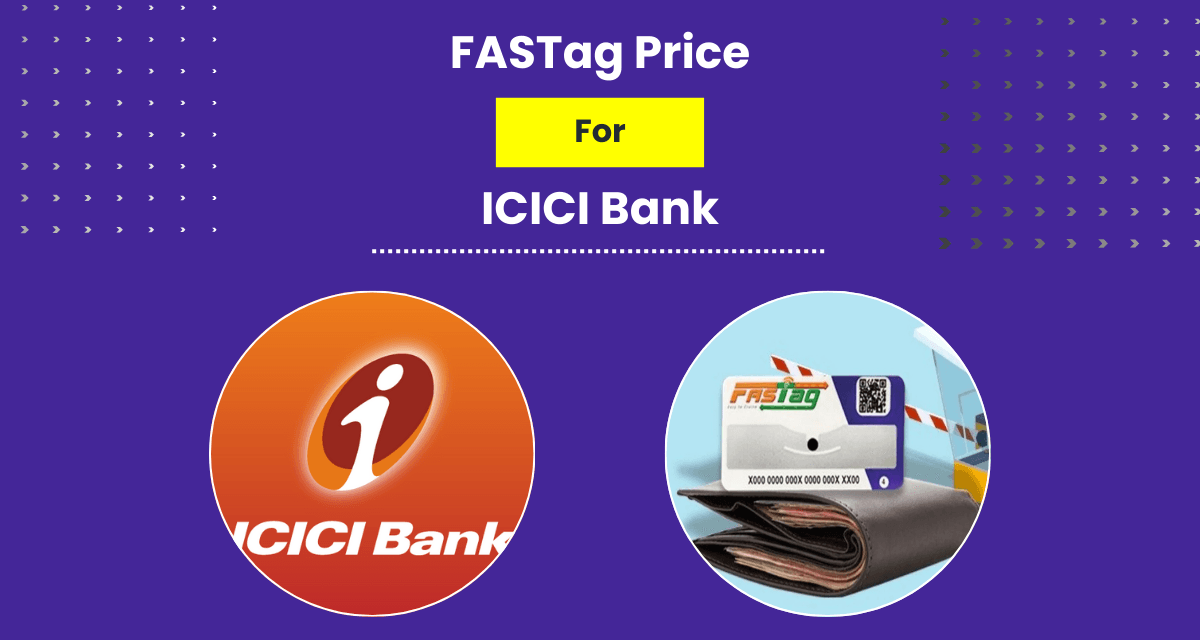

In India, where FASTag has become mandatory for toll payments on national highways, having a FASTag is a must for smooth and uninterrupted journeys. For users choosing ICICI Bank's FASTag, understanding the cost structure of ICICI FASTag encompassing purchase, security deposits, and replacement costs, is essential to avoid unexpected fees.
This guide breaks down every component of ICICI Bank FASTag price to help you manage your toll payments effortlessly.
With FASTag being an integral part of the toll collection system across India, ICICI Bank's FASTag service has gained popularity due to its convenience and affordability. Whether you’re a frequent traveler or a casual commuter, understanding the ICICI FASTag cost structure ensures you are well-prepared for all toll-related expenses. In this article, we’ll detail the ICICI FASTag price breakdown, including the cost of a new card, security deposit requirements, and the minimum balance needed to keep your FASTag active.
Purchasing a new ICICI Bank FASTag involves a few initial charges that cover setup and activation. Here’s what you can expect:
One-Time Joining Fee: When buying a new FASTag, an upfront joining fee applies. This ICICI FASTag price component is relatively low and varies depending on the vehicle type. For instance, the joining fee for a car is ₹99.12, which includes Goods and Services Tax (GST), an affordable initial investment.
Security Deposit: A mandatory, refundable security deposit is charged for each ICICI FASTag. This ensures that funds are available to cover any discrepancies, should the account fall short. The amount varies based on the vehicle category and is part of the ICICI Bank FASTag price structure. For example, the security deposit for a TATA Ace or similar mini Light Commercial Vehicle is ₹200, while the security deposit for a 3-axle bus is ₹400.
Initial Balance Requirement: Besides the joining fee and deposit, ICICI FASTag users need to preload an initial balance. This ensures the tag is immediately ready for toll payments upon activation. For example, For Car, Jeep, and Vans, the minimum balance to keep your FASTag from being banned is Rs 150. If your FASTag Wallet does not include Rs 150, your FASTag will be blacklisted owing to a low balance.
By understanding these components, you can make an informed decision about the total ICICI FASTag cost required to set up a new card and get started with cashless toll payments.
The security deposit is a crucial part of the ICICI FASTag cost structure. This refundable amount serves as a safeguard, covering any potential shortfalls if your FASTag account runs low.
In addition to the security deposit, ICICI Bank requires FASTag users to maintain a minimum balance, also known as a threshold amount. This threshold ensures that sufficient funds are available to cover toll charges without interruption. The minimum balance required depends on the vehicle category as follows:
TATA Ace and similar mini Light Commercial Vehicle: The threshold amount is ₹100 with a ₹200 deposit and Violet tag color.
Light Commercial Vehicle / Mini Bus: The threshold amount is ₹100 with a ₹300 deposit and Orange tag color.
Bus 3 Axle: The threshold amount is ₹100 with a ₹400 deposit and Yellow tag color.
Truck 3 Axle: The threshold amount is ₹100 with a ₹500 deposit and Yellow tag color.
Bus 2 Axle / Truck 2 Axle: The threshold amount is ₹100 with a ₹400 deposit and Green tag color.
Tractor / Tractor with trailer / Truck 4/5/6 Axle: The threshold amount is ₹100 with a ₹500 deposit and Pink tag color.
Truck 7 Axle and above: The threshold amount is ₹100 with a ₹500 deposit and Blue tag color.
Earth Moving / Heavy Construction Machinery: The threshold amount is ₹100 with a ₹500 deposit and Black tag color.
By maintaining the required threshold amount based on your vehicle type, you can ensure that your ICICI FASTag account is always active and ready for toll payments without any disruptions.
If your ICICI FASTag is lost, damaged, or needs renewal, additional ICICI FASTag costs apply for re-issuance or renewal. These fees ensure users can quickly replace or renew their FASTag without disruptions in toll payments.
Should your FASTag be lost or damaged, a replacement incurs a nominal fee, typically ₹100. Reporting lost or stolen tags to ICICI Bank immediately can help prevent unauthorized toll charges.
Although ICICI FASTags are designed to last for several years, a nominal renewal fee (usually around ₹100) may apply after extended usage. This renewal cost is minimal, allowing users to keep their FASTag functional without needing a full replacement.
You May Also Like --> How to Create FASTag Account?
By factoring in these replacement and renewal fees, you’re better prepared to manage occasional FASTag-related costs and maintain uninterrupted service.
By understanding the ICICI FASTag price for replacement or renewal, you can plan for these occasional costs and ensure uninterrupted service.
Maintaining your ICICI FASTag price threshold is easy, thanks to ICICI Bank’s wide array of recharge options:
ICICI Mobile App: The ICICI mobile app allows you to check balances, recharge, and monitor all FASTag transactions in one place.
UPI Integration: ICICI FASTag supports UPI for instant recharges, providing flexibility to keep your FASTag active anytime, anywhere.
Online Banking: ICICI Bank customers can use net banking to recharge their FASTag account quickly and securely.
Ensuring your balance is always topped up helps avoid penalties or declines at toll plazas, enhancing your travel experience.
Applying for ICICI Bank FASTag simplifies toll payments, offering transparent costs, ease of use, and multiple recharge options. By understanding the ICICI FASTag price components, from new card costs to replacement fees, you’re better equipped to manage toll expenses and keep your account in good standing.
Opting for ICICI Bank FASTag ensures you enjoy the benefits of a trusted digital toll payment system backed by exceptional service. From seamless toll plaza transitions to convenient recharges, ICICI FASTag offers a smart, efficient, and cost-effective way to travel India’s highways.